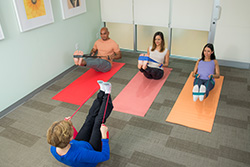Using meditative movement to reduce stress, effects of chronic illness

Today’s fast-paced and demanding world can take a toll on our health. There are pressures in virtually every aspect of life, from the workplace to relationships with family and friends, and health concerns. These stresses in life have been found to contribute to the onset of chronic diseases, such as depression and heart disease.
Meditative movement — exercises like yoga and Pilates that focus on breathing and a cleared state of mind aimed at a deep state of relaxation — has been found to be an effective way to combat chronic illness and aide in the healing process for patients undergoing surgery or cancer treatment.
“These exercises focus on synchronizing your breathe with the movement and being very aware of your body at that moment. This activates the parasympathetic nervous system,” says Chiti Parikh, MD, an internist and co-director of the Integrative Health and Wellbeing program at NewYork-Presbyterian in collaboration with Weill Cornell Medical Center. “The nervous system is split in two — the fight-or-flight response, which is the sympathetic system, and the relaxation response, which is parasympathetic system. During the course of the day, we constantly go back and forth between the two. But for most of us, throughout the day, are stuck in that fight-or-flight response. ”
This paralysis, she says, can increase blood pressure, heart rate, mood, stress hormone level, and affect brain wave patterns.
“When you breathe a certain way it activates the vagus nerve that controls the relaxation response. By breathing a certain way, you are manually stimulating that nerve and putting your body in the relaxation phase and out of the fight-or-flight response,” Dr. Parikh says.
Research studies have shown that the regular practice of yoga, an ancient Indian spiritual practice, may produce many health benefits, including weight loss, improved cholesterol, and lowered blood pressure. It also helps improve flexibility, increase muscle strength and tone, and is an effective weight loss method. Pilates, an exercise system that was initially created for bed-bound World War I survivors, has been found to help with chronic back pain.
“Pilates is mostly focused on core strengthening, a lot of back pain actually happens because the core is weak. So Pilates is good at core strengthening and not just abs. The back is actually the biggest part of the core muscles,” Dr. Parikh says. “It is also interesting to see that Pilates has been shown to be very good in the elderly population, specifically muscle strength, balance, and gait. So it decreases the risk of fall and has been shown to help with osteoporosis or bone density.”
The Integrative Health and Wellbeing Program at NewYork-Presbyterian offers guided yoga and Pilates courses for members of the community and patients. These courses can be customized to the individual needs of the participants, particularly for those with injuries or certain medical conditions.
“The Integrative Health and Wellbeing Programs focuses on a more holistic model where all types of care are integrated under one roof. What we do is combine the best of conventional medicine with top-notch doctors along with these integrative modalities,” she says. “We’ve taken a lot of care in assembling a team that has a lot of experience, especially in a clinical setting. So to have a Pilates instructor who knows how to work with cancer patients or a yoga instructor who knows how to work with someone who has had knee surgery or osteoporosis is very important.”
Located in the David H. Koch Center at NewYork-Presbyterian, the Integrative Health and Wellbeing program’s spa-like environment and services compliment medical therapies that clients are undergoing. The center has courses specifically designed to help patients heal following surgery and during cancer treatment. Participants in the “Prepare for Surgery, Heal Faster™” course have been found to have less anxiety before surgery, use 23 to 50 percent less pain medication after surgery, and heal faster than those who do not take the course.
The center also offers classes for strength and balance, mindful meditation, and revitalizing flow yoga.
“No matter where you are on your health journey — whether you’re a 30-year-old trying to work on your abs of steels or a 70-year-old trying to work on your balance — we can help you create that customized health plan to reach your end goal,” Dr. Parikh adds.
Join us for a class!
Monday, November 12, 2018
Vinyasa Yoga at 7:10 AM
Revitalizing Flow Yoga at 8:10 AM
Mindfulness Meditation at 6:00 PM
Mat Pilates at 6:00 PM
Wednesday, November 14, 2018
Vinyasa Yoga at 7:10 AM
Revitalizing Flow Yoga at 8:10 AM
Mat Pilates at 5:00 PM
Friday, November 16, 2018
Restorative Yoga at 11:30 AM
Monday, November 19, 2018
Vinyasa Yoga at 7:10 AM
Revitalizing Flow Yoga at 8:10 AM
Mindfulness Meditation at 6:00 PM
Mat Pilates at 6:00 PM
Wednesday, November 21, 2018
Vinyasa Yoga at 7:10 AM
Revitalizing Flow Yoga at 8:10 AM
Friday, November 23, 2018
Restorative Yoga at 11:30 AM
Monday, November 26, 2018
Vinyasa Yoga at 7:10 AM
Revitalizing Flow Yoga at 8:10 AM
Mindfulness Meditation at 6:00 PM
Mat Pilates at 6:00 PM
Wednesday, November 28, 2018
Vinyasa Yoga at 7:10 AM
Revitalizing Flow Yoga at 8:10 AM
Mat Pilates at 5:00 PM
Friday, November 30, 2018
Restorative Yoga at 11:30 AM
Monday, December 3, 2018
Vinyasa Yoga at 7:10 AM
Revitalizing Flow Yoga at 8:10 AM
Mindfulness Meditation at 6:00 PM
Mat Pilates at 6:00 PM
Wednesday, December 5, 2018
Vinyasa Yoga at 7:10 AM
Revitalizing Flow Yoga at 8:10 AM
Mat Pilates at 5:00 PM
Visit nyp.org/integrativehealth for the full listing of upcoming classes.



